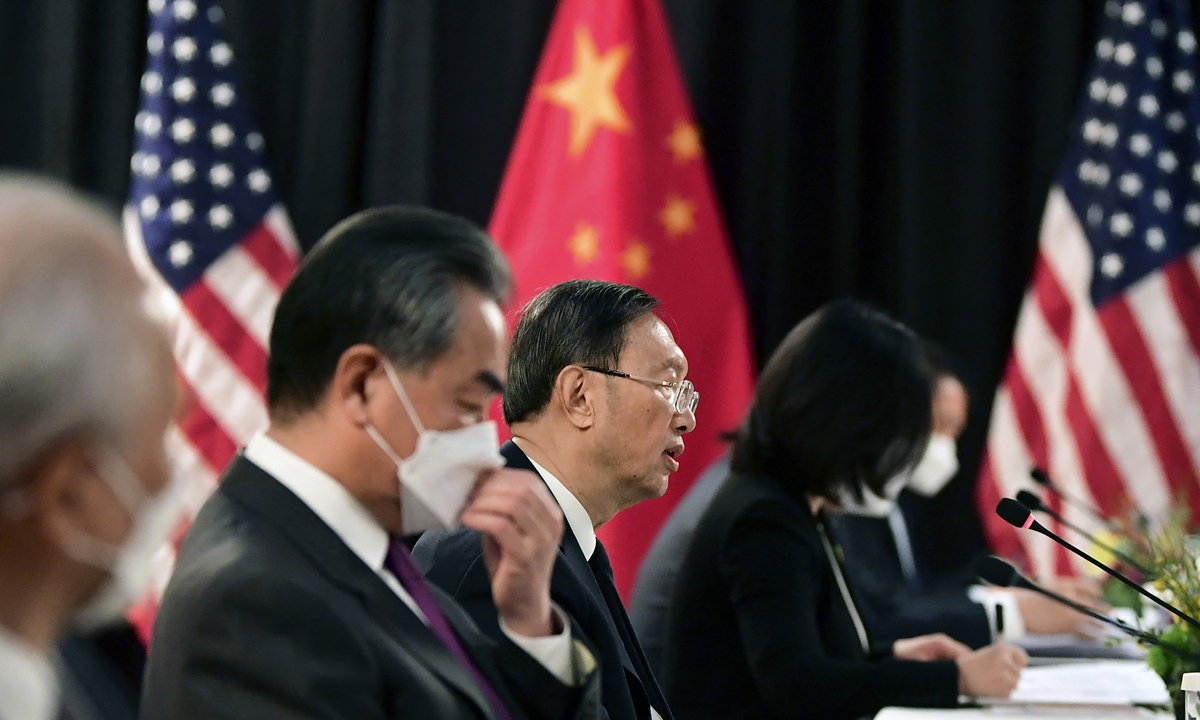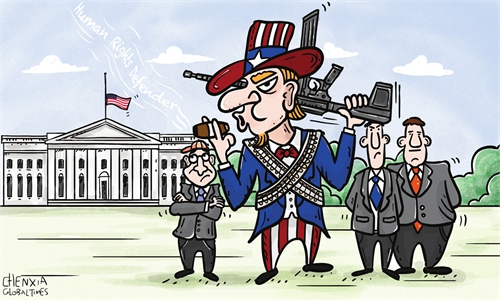Americans’ disgust with own govt grows as Chinese officials criticize US human rights

Yang Jiechi (center), a member of the Political Bureau of the Communist Party of China Central Committee and director of the Office of the Central Leading Group for Foreign Affairs, criticizes human rights issues in the US at the opening session of US-China talks in Anchorage, Alaska on March 18, 2021. Photo: AFP
A senior Chinese official's sharp criticism of the US' human rights situation has triggered a negative response from the American people toward the US' human rights and democratic systems, a report based on sentiment analysis by Chinese researchers showed.Experts said that the criticism made by Yang Jiechi, a member of the Political Bureau of the Communist Party of China (CPC) Central Committee and director of the Office of the Central Leading Group for Foreign Affairs, at the recent Alaska high-level meeting struck a chord among the American public.
The study was carried out by Zhou Wenlu and Liang Haiming, two researchers with China's Hainan University Belt and Road Research Institute (HUBRRI). It collected related public opinion from around the world in the week following the Alaska meeting held on March 18 and 19, and it analyzed keywords and sentiment that was expressed.
About 14,000 reports and online comments from different countries and regions had been included as of March 26, according the report that Liang, who is also the dean of the institute, sent to the Global Times on Monday.
Using "Biden administration+Anchorage" as keywords, the researchers searched for related content on Twitter and analyzed the trend of sentiment in public opinion about the Biden administration in American society. It found that content with a neutral attitude accounted for 72 percent, a negative attitude accounted for 22 percent, and a positive attitude accounted for 5 percent.
Text analysis in the 22 percent "negative" category showed that American people's disappointment toward the Biden administration was largely due to a keyword that appeared at the Alaska meeting: "US human rights."
Since Biden took office, the number of illegal immigrants in the US has increased, which, to a certain extent, has made the COVID-19 epidemic in the US more complicated, and fueled public discontent with the current administration, Liang explained to the Global Times.
The American people found that Biden administration had a poor performance in human rights, which led to a variety of problems at home, so when China talked about human rights in the US, they felt the same and their disgust toward the current administration grew further, Liang said.
"Such a finding means that the US government needs to pay attention to its own affairs that its people care about, and solve such issues well, instead of interfering in other people's affairs," Liang said.
Liang noted that the study also found that American voters expect that the Biden administration will pay more attention to economic policies in the area of diplomacy, do more practical things, and figure out how to increase domestic employment in the US and develop the domestic economy.
These findings are consistent with a previous investigation conducted by the Pew Center in February, which revealed that the American public sees economic and security issues as the top concerns in terms of the country's foreign policy, Liang said.
The report also pointed out that the attention of Indian society to the Alaska meeting was second only to that of the US, and analysis on content with a neutral attitude showed two noticeable opinions in India.
Some people believe the Alaska meeting showed that China is telling the new US government that China's military, ideological, and economic strength has given it confidence to face challenges from the US. Others, however, think that the relationship between the US and China is becoming increasingly tense, under which circumstance India must give itself multiple options to deal with the most urgent challenges.
The Quadrilateral Security Dialogue relationship can only be one option for India, and India's strategic future cannot be highly tied to the chariot of the Quad, the report said.
The report suggested China should do more in "showing the sword" diplomacy and "Pingshi diplomacy", or "view other countries equally" policy, which will win more support for China from the international community.
"Showing the sword is not intended to attack, but to seek for peace," Liang explained, adding that in such a case, others also have to weigh the consequences of a confrontation.
Liang also suggested that China should use economic and financial means to get in contacts with other countries in the future, promoting economic and trade relations as a result.
China has done well in its economic rise in recent years. When the economies of other countries are badly shaken, what people want to hear most is how their economy can grow, and how they can find a job, keep a job, and make more money, Liang said.




